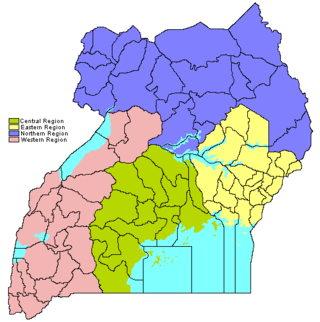Twenty-first century
Years in Africa | |
|---|---|
| Sovereign states |
|
States with limited recognition | |
Dependencies and other territories |
|
This is a timeline of History of Uganda . Each article deals with events in Uganda in a given year.

Uganda, officially the Republic of Uganda, is a landlocked country in East Africa. The country is bordered to the east by Kenya, to the north by South Sudan, to the west by the Democratic Republic of the Congo, to the south-west by Rwanda, and to the south by Tanzania. The southern part of the country includes a substantial portion of Lake Victoria, shared with Kenya and Tanzania. Uganda is in the African Great Lakes region, lies within the Nile basin, and has a varied but generally modified equatorial climate. As of 2023, it has a population of around 49.6 million, of which 8.5 million live in the capital and largest city of Kampala.
The history of Uganda comprises the history of the people who inhabited the territory of present-day Uganda before the establishment of the Republic of Uganda, and the history of that country once it was established. Evidence from the Paleolithic era shows humans have inhabited Uganda for at least 50,000 years. The forests of Uganda were gradually cleared for agriculture by people who probably spoke Central Sudanic languages.

Uganda has formal diplomatic relations with many countries, some accredited. Since the colonial era and after independence Uganda has grown to be one of the most important African countries. Uganda has diplomatic relations with many countries throughout Africa, the Americas, Asia, Europe and Oceania. Uganda is a member of the United Nations and the Commonwealth of Nations since 1962.

Apollo Milton Obote was a Ugandan politician who led Uganda to independence from British colonial rule in 1962. He served as the second prime minister of Uganda from 1962 to 1966 and later as the second president of Uganda from 1966 to 1971 and from 1980 to 1985.

"Oh Uganda, Land of Beauty" is the national anthem of Uganda. George Wilberforce Kakoma composed the music and authored the lyrics. It was adopted as the national anthem in 1962, when the country gained independence from the United Kingdom. It is musically one of the shortest national anthems in the world. Consequently, multiple verses are sung when it is performed in public.

The flag of Uganda was adopted on 9 October 1962, the date that Uganda became independent from the British Empire. It consists of six equal horizontal bands of black (top), yellow, red, black, yellow, and red (bottom); a white disc is superimposed at the centre and depicts the national symbol, a grey crowned crane, facing the hoist's side.

The Uganda national football team represents Uganda in association football and is controlled by the Federation of Uganda Football Associations.

The prime minister of Uganda chairs the Cabinet of Uganda, although the president is the effective head of government. Robinah Nabbanja has been the prime minister since 21 June 2021.

The Uganda Electoral Commission (EC) provides national elections for a president and a legislature. The president is elected for a five-year term. The Parliament is composed of members directly elected to represent constituencies, and one woman representative for every district; as well representatives of special interest groups, including the army, youth, workers and persons with disabilities.
The New Vision is a Ugandan English-language newspaper published daily in print form and online.

The parliament of Uganda is the country's legislative body. Unicameral, the most significant of the Ugandan parliament's functions is to pass laws that will provide good governance in the country. The government ministers are bound to answer to the people's representatives on the floor of the house. Through the various parliamentary committees, parliament scrutinises government programmes, particularly as outlined in the State of the Nation address by the president. The fiscal issues of the government, such as taxation and loans need the sanction of the parliament, after appropriate debate. Parliament must confirm some Presidential nominations and may force a Minister to resign by passing a motion of censure.

The Constitution of Uganda is the supreme law of Uganda. The fourth and current constitution was promulgated on 8 October 1995. It sanctions a republican form of government with a powerful President.

The regions of Uganda are known as Central, Western, Eastern, and Northern. These four regions are in turn divided into districts. There were 56 districts in 2002, which expanded into 111 districts plus one city (Kampala) by 2010.

This is a survey of the postage stamps and postal history of Uganda.

Uganda became an independent sovereign state on 9 October 1962. As a Commonwealth realm, the British monarch, Elizabeth II, remained head of state as Queen of Uganda until the link with the British monarchy was severed on 9 October 1963 and the Kabaka (King) of Buganda, Sir Edward Mutesa II, became the first President of Uganda.

Elizabeth II was Queen of Uganda as well as the head of state of Uganda from 1962 to 1963, when the country was an independent constitutional monarchy. She was also the sovereign of other countries in the Commonwealth of Nations, including the United Kingdom.

Josephine Nambooze is a Ugandan physician, public health specialist, academic, and medical researcher. She is an emeritus professor of public health at Makerere University School of Public Health. Nambooze was the first female East African to qualify as a physician circa 1959.
Trade unions in Uganda have existed since the 1930s. For much of Uganda's history trade union activities have been greatly shaped by national politics and by events external to the country's labour movement. The experiences of trade unions in Uganda fall into four periods: during the British colonial period, from independence to the rise to power of Idi Amin (1962-1971), the Idi Amin dictatorship (1971-1979) and through to the present.

Turkey has an embassy in Kampala. Uganda has an embassy in Ankara.